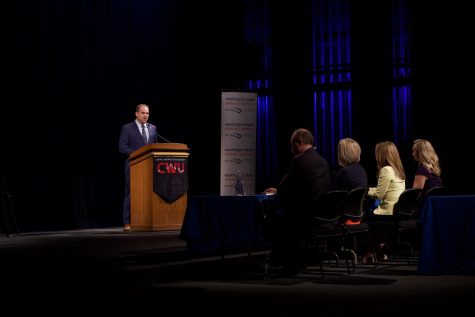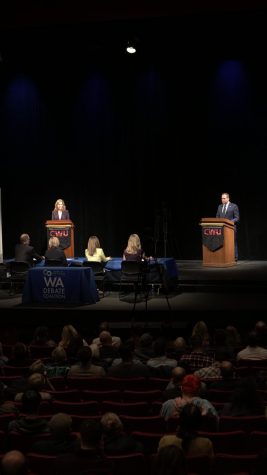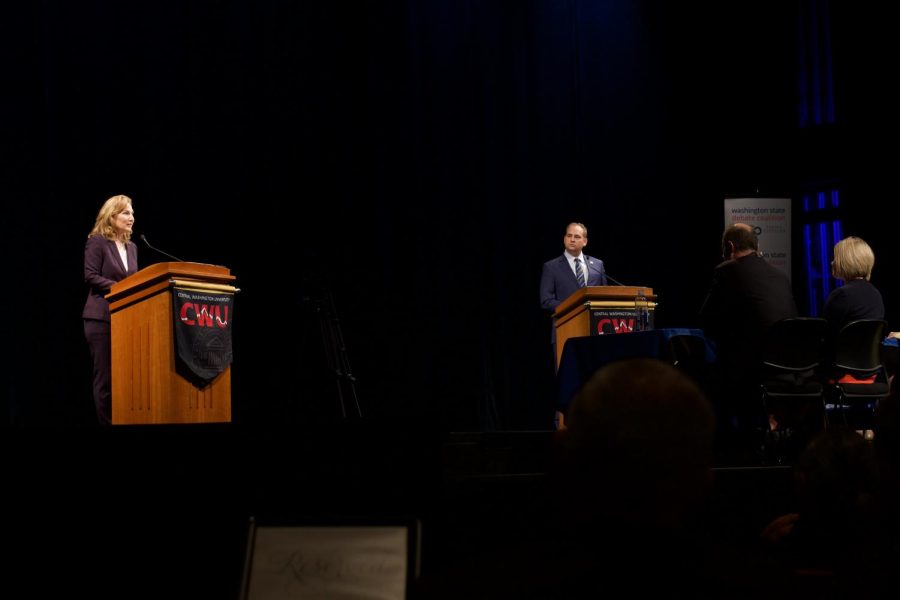Schrier and Larkin battle it out for House seat at Congressional Debate
CWU hosted televised event at McConnell Hall
Kim Schrier (left) and Matt Larkin (right) take to the stage for the Congressional Debate. Photo by Brevin Ross.
October 31, 2022
Incumbent Democratic Congresswoman Kim Schrier and her Republican challenger Matt Larkin faced off during their congressional debate on Oct. 28 at McConnell Hall. The debate marks the last time the two will go head-to-head before the election on Tuesday, Nov. 8.
The congressional seat of the 8th district of Washington is up for grabs, and challenger Larkin is attempting to stop Congresswoman Schrier from securing a third term.
There were many heated topics up for debate from the panel including abortion, crime, inflation economic concerns like gas prices and cost of living and immigration.
Key issues from both sides
The two candidates provided vastly different responses as to why the cost of living has gone up and why the economy has been dealing with inflation.
Larkin responded that the overspending of Democratic policies such as the $1.9 trillion stimulus package supported by representative Schrier are to blame for inflation.
“That was reckless, we need to take a good hard look at the amount, that was a $1.9 trillion bill, that’s a huge price tag,” Larkin said. “That bill never should have been voted for.”
Schrier responded by saying it was price gouging from oil companies and supply chains to blame.
“Gas and oil companies are right now making record profits, the highest in more than a decade and quarter over quarter those profits are going up,” Schrier said.
Another topic of the debate was crime. Judges shared that in 2020, more Americans died from gun violence than any other recorded year.
Schrier pushed for stricter gun control and more restrictions to make sure guns don’t end up in the wrong hands.
“I recognize second amendment rights and I respect them,” Schrier said. “I’m also a pediatrician and a mom and I know that guns are the number one cause of death in children in this country, and that is why we need safe gun ownership legislation. These are common sense steps, enhanced background checks to make sure guns don’t get into the hands of criminals.”

Larkin acknowledged the rise in crime and responded with the percentages of King County’s crime as well as making his statement known that he is backing police and law enforcement.
“We’ve got to do something about violence,” Larkin said. “We’ve got to do something about rising crime, and the way to solve that is by backing the brave men and women in blue.”
The hottest topic up for debate which attracted the little crowd engagement there was, was abortion and reproductive rights, with Schrier being pro-choice and Larkin being anti-abortion.
Although Larkin was vocally supportive of the anti-abortion movement and stated he believes there shouldn’t be exceptions for abortions, he stated that reproductive rights wouldn’t change in Washington if he was elected.
“Let me be clear, nothing is changing in Washington state,” Larkin said. “Women are not losing access to safe and legal abortions nor will they. The court has ruled this is a state’s issue and I’m extremely happy with it being at the state level, I’m not planning on going back to DC to and pushing for a federal abortion ban.”
Larkin also said he believes he is not the “extreme one” on his stance with abortion.
“If you’re a minute from having a baby, and it’s a girl and you wanted a boy, you can terminate that baby’s life minutes before delivery,” Larkin said. “That’s an extreme position, that’s extreme to 90% of the American public, so I’m not the extreme one in my position here.”
Larkin’s comments were followed by brief laughter from a few members of the crowd that were quickly silenced from the debate panel.
Schrier was adamant that Larkin was anti-abortion and that he would support an abortion ban if elected.
“That is exactly what he supports and he already noted that he has said with no exceptions for rape or incest,” Schrier said. “It’s outrageous, it’s extreme, it’s out of touch. A national ban would override the protections we have in Washington state. Don’t be fooled, it’s an extreme and dangerous agenda.”

Community response
After an hour of discussion, tough questions and rebuttals, cheers rang out as the debate came to a conclusion. As people made their ways to the exits, many reflected and talked amongst each other about what they took away from the debate overall.
CWU students like Lucas Pierron and Cole Smith said the debate itself was a positive experience.
“I thought it was great,” Pierron said. “I thought it was well organized. It was a good balance of vitriol between the two candidates and [a] well thought out discussion.”
Cole Smith said coming into the debate he was excited, however after the fact, he felt there were aspects of the debate that were missing.
“It was as exciting of a debate as I was expecting going into it,” Smith said. “I thought going into it that they would be a little more aggressive, it seemed as if they both kind of evaded some of the questions.”
Pierron also said he felt both candidates avoided some questions at times.
“There were a few points in there where I was visibly shaking my head because I was like, ‘come on, answer the question, like directly,’” Pierron said.
Pierron said one take-away he got from the debate was a feeling of middle ground in the way they conduct their campaigning.
“I think what they both displayed is that they have a skill of marketing the way they talk about their own beliefs,” Pierron said. “Even if it doesn’t directly align with the way they voted previously.”
Smith said one of the big takeaways from attending the debate was confidence in Schrier’s sources and information she presented.
“She has the information to back her stuff up and she will speak about it,” Smith said.
Ellensburg community members also shared their thoughts on the debate. Some felt split emotions about the outcome.
Ellensburg residents like Hannah Purdue and Lisa Bliss made their feelings clear on who they support.
“It’s that important to me because my daughter doesn’t have the same rights I do,” Purdue said as she teared up. “I feel like we’re going backwards.”
Bliss echoed similar sentiments.
“I’m a woman and I believe that women’s rights are human rights and that they should not be taken away from women, and Dr. Schrier supports that and I support her,” Bliss said.
Schrier seemed to garner support from most women The Observer spoke to.
“It was important for me to hear Dr. Schrier state that she believed that I could make my own health care decisions and all the other women in the country could,” said Sammamish resident Beth Paisley. ”It was important for me to hear if her opponent Matt Larkin would be … willing to make a statement and he deflected, deflected, deflected.”
Larkin garnered clear support from law enforcement King County police officer Oscar, who asked The Observer to print only his first name to remain unaffiliated with his work force.
“I see the effects of poor legislation and poor leadership on the ground,” Oscar said. “I see overdoses, I see murder. I see all types of violence and all types of drug use on a daily basis.”
He said he feels that under Schrier’s leadership, police haven’t received the proper resources and training to deal with the increasing crime and drug use.
“We need people to be trained to handle different things,” Oscar said. “People in crisis, mental health, people experiencing all types of different things, the kind of training that her bill sponsored doesn’t work out in the streets.”
Importance of debates at CWU
CWU Chief of Staff Andrew Morse told The Observer earlier in the week that the debates are a way for the campus and the community of Ellensburg to come together to discuss important topics.
“One of the important things that colleges and universities do is to engage with our communities and allow for conversation on the issues of our time,” Morse said. “We’re proud to play that role in our community.”
Morse also said hosting something like the debate is a symbolic step in the work that the university does in building town-gown relationships. Another big part of hosting the debate, according to Morse, is the ability to provide direct access to students to engage in the civic process.
“This is a way that universities help support the educational mission, help support civic engagement and help remove borders between the community that we serve and the university,” Morse said. “The opportunity to host a debate among two candidates applying for office is an opportunity to formulate your opinions as you think about going to the polls.”
Updated for accuracy.


